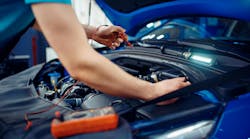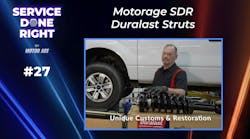Thanks to a surging economy, the commercial tire market is on a roll. With a new commercial tire plant opening in Mississippi in October, Yokohama Tire Corporation (YTC) is poised to increase market share. Rick Phillips, vice president of sales, explains current market developments and how they will affect the industry.
Question: The commercial tire market was up last year. Why?
Rick Phillips: In 2014, the market was up eight to 10 percent over 2013. It all starts with the economy. The stock market is doing well, which has led to increased consumer confidence and spending. When consumers buy things, they get moved by truck, and that’s good for our industry. We’re definitely back to pre-recession levels.
Question: What improved sectors of the economy have most impacted the trucking industry?
Phillips: Manufacturing in the U.S. is now more attractive, which is good because products get hauled more. Housing has also been on the upswing. Any time somebody buys a house, they purchase many things that go with it, and that spurs spending. General road construction, fracking and oil drilling have increased, too.
Question: When the economy is rolling, do OEM truck sales go up?
Phillips: OEM sales is one of the indicators for market strength. If you’re a trucking company, the only reason you would buy a truck is to move freight.
Right now, OEM sales, especially Class 8, are close to all-time highs. The North American fleet of Class 8 trucks is seven- to eight-years old on average. It should be below six-years old to lower maintenance costs.
Question: Will the commercial tire market be able to sustain eight- to 10-percent annual growth?
Phillips: It’s difficult to keep growing at that pace, so it might slow some. But 2015 still looks good for the industry and Yokohama.
Question: What are some of the hot topics that will affect the industry and Yokohama?
Phillips: Government regulations will play a big role this year, and fleets everywhere are dealing with a huge driver shortage problem. Some fleets are not buying the equipment they want because they don’t have enough drivers.
Question: What is the biggest change you’ve seen in the market the last five years?
Phillips: It’s the continued chase of more fuel-efficient products and trying to reduce greenhouse gases. The challenge is trying to achieve a lower rolling resistance without sacrificing tire life. It’s tough because if you make the tread shallower it is more fuel efficient but the tire also wears out quicker.
Question: What opportunities exist for tire technology development?
Phillips: There are several different ways to make tires more fuel-efficient. You can simply take rubber off the tread and/or change the rubber compound. There are certain things you can do with the casing construction that makes it roll over easier. We have some innovative things we do with curing the tire with regards to length of time and the temperature at which we cure it. The biggest challenge is trying to stay ahead of the technology curve. You want a tire that's fuel-efficient, lasts a long time and is going to be retreadable. A good example of fuel-efficient tire technology is our 703ZL drive tire. It’s 32/32nds – the deepest drive tire on the road, and it’s also the deepest SmartWay-verified drive tire in the world.
Question: How is Yokohama staying ahead of this technology curve?
Phillips: We have R&D departments and test facilities all over the world. It's just engineers looking at anything and everything possible. The U.S. is a very complicated, competitive market compared to other markets in the world. There's a lot of competition, which ultimately is good for the fleet because they’re presented with multiple options. Without competition, you probably wouldn't see the tires that have been developed and the technology used.
Question: How do tires affect a fleet’s costs?
Phillips: Tires are usually the second-largest expense for a fleet behind fuel. We work with fleets to help them set up good, proactive tire maintenance programs. If they catch problems in the yard, that eliminates the costs of the truck sitting on the side of the road. We work with our dealers to help fleets lower their costs through tires.
Question: How does Yokohama educate fleets with its maintenance program?
Phillips: Every fleet has a different level of needs. Usually, they're looking for really small incremental gains that can make a big difference in the bottom line. It could be with alignments, balance, air pressure or the tread designs they’re running. There are a lot of variables that we have to evaluate to help them close the gaps.
Question: What other issues do fleets and independent truckers face?
Phillips: A new challenge is being compliant with all the recent government regulations. Trucking is a very competitive business with razor-thin margins. It’s all about delivering freight at the lowest cost and as efficiently as possible.
Question: How are low-cost, offshore competitors affecting the U.S. market?
Phillips: There’s a lot of the lower-priced, third-tier product in the market that looks like first-tier product, but doesn’t perform like it. The challenge with fleets is convincing them. One of the problems with these tires is they're not very consistent, especially when it comes to retreading. One batch is fine and retread well, but the next isn’t. To come up with a consistent product that's going to perform the same every time is not easy for many of these companies. Yokohama chooses to take the quality route. We invest in our equipment and technology to make sure we produce a consistent, quality product.
Question: What trend have you seen developing in the commercial tire industry?
Phillips: There's a big shift in regional products due to the increase in intermodal business. There are short freight trips at the front and back ends of a rail haul. A product goes from a truck haul to a rail car to a truck, as opposed to one truck taking it across the country. There's a big demand for shorter-distance and higher scrub tires right now, so we’re building better products to fit that niche.
Question: What’s the latest update on the new Mississippi (YTMM) factory?
Phillips: The construction on the plant, installation of machineries and equipment and planned recruitment for the required jobs are all near completion. We’re on target to roll out the first pre-production tire in May and mass production will start in October. Volume will be low at first, accelerate, then really ramp up in 2016.
Question: Where do you see growth opportunity coming?
Phillips: We’re going to target national fleets and increase our penetration. We have a very good truck stop network that we're going to keep growing. Our OEM presence is also going to grow a lot. And we have the best Servicing Dealer Network in the industry….bar none.
Question: How is the new Western Region Distribution Center in Chino, Calif., going to benefit Yokohama and its dealers?
Phillips: It’s almost double the square footage of what we had, and it's going to make us more efficient in distributing tires. The new software helps us forecast our sales better, which drives better production orders and puts the tires in the right warehouses. Our customers can expect to get inventory much faster thanks to tires being made at the Mississippi plant and because of the new DC’s warehouse management system.
Question: When YTMM is completely operational, how much of YTC’s product mix will come from Mississippi versus a plant outside the U.S.?
Phillips: By the time Mississippi is running, about 60 percent of the truck tires will come from the plant. We're already talking about bringing on Phase Two, which will produce an extra million tires a year.
Question: What new products have you launched lately?
Phillips: We have three new tires currently on sale: the MY627W Spec-2, the 101ZL Spec-2 and the 709ZL. The MY627W Spec-2 is our all-position waste tire – very durable, with sturdy casing and a cut- and chip-resistant tread compound. The Spec-2 means we’ve reworked it to where it accepts the wider retreads. Best of all, it has a six-year warranty with unlimited retreading – best in the industry.
The 709ZL is a fuel-efficient, shallow drive tire. We launched the 295/75/22.5 at Mid-America Trucking Show last year and now have three new sizes: 11R/22.5, 11/24.5 and 285/75/24.5. It’s for over-the-road, high-speed, long-haul – a demanding and growing industry segment. It also has a very retreadable casing.
The 101ZL Spec-2 is an improvement of our 101ZL – absolutely one of the best steer tires on the market. We’ve made some enhancements on it to give it a flatter footprint and increase the elongation in the rubber compound. It reduces cuts, chips and tears and still delivers long mileage with smooth even wear. We're also adding 16-ply tires in three sizes. The 295/75/22.5 16-ply has a 7,100 lb capacity, which is better than the 6,600 lbs the standard 16-ply (or load range H) features.
Question: Is Yokohama rolling out any other new commercial truck tires in 2015?
Phillips: We do have some more products on the drawing board: a new super-regional product, some more ultra-wide base products and an open-shoulder drive tire.
Yokohama Tire Corporation is the North American manufacturing and marketing arm of Tokyo, Japan-based The Yokohama Rubber Co., Ltd., a global manufacturing and sales company of premium tires since 1917. Servicing an extensive sales network throughout the U.S., Yokohama Tire Corporation is a leader in technology and innovation. The company’s complete product line includes tires for high-performance, light truck, passenger car, commercial truck and bus, and off-the-road mining and construction applications. For more information on Yokohama’s broad product line, visit www.yokohamatire.com.


